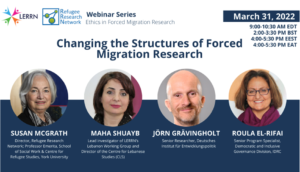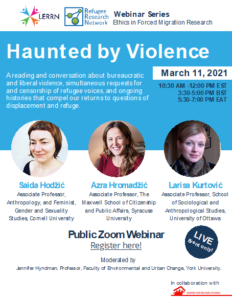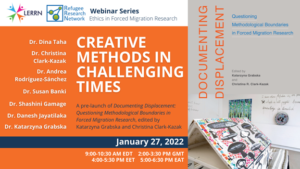The RRN Research Digest provides a synopsis of recent research on refugee and forced migration issues from entities associated with the RRN and others.
You can download the digest in PDF format here: RRN Research Digest No. 125
NEW RESEARCH AND PUBLICATIONS
Abdelaaty, L. (2022). Do Rights Violations Deter Refugees, Journal of Ethnic and Migration Studies. Do crackdowns by destination countries deter refugees? Much of the existing literature conflates containment measures (forcibly restricting refugees in their home region or country) and deterrence policies (discouraging refugees by making the destination appear less attractive). In addition, empirical studies have focused almost exclusively on Western countries and analyzed the effects of acceptance rates or policy reforms on the number of asylum applications lodged. In contrast, this paper examines whether rights violations deter asylum-seekers and refugees by leveraging a global dataset drawn from reports by the US Committee for Refugees and Immigrants. The author finds that deportation, detention, and encampment are not associated with decreases in asylum applications or refugee arrivals and may be associated with increases in them in some cases. While reduced access to the labour market may deter minimal numbers of asylum-seekers and refugees, there are other sound reasons for destination countries to eschew restrictive employment policies (50 free eprints)
Danisi, C., Dustin, M., Ferreira, N., Held, N., and Querton, C. (eds.). (2022). Sexuality, Gender and Asylum: Refugees at a Crossroads, Research Topic in Frontiers in Human Dynamics. In recent years there has been increasing research interest in SOGI asylum in Europe and beyond. Scholars from various disciplines have explored how SOGI claims are often treated in an inappropriate and stereotyped way with repercussions concerning claimants’ proof of membership of a particular social group (PSG), risk of persecution and credibility. Yet, despite this growing body of literature on SOGI asylum, it is clear that many theoretical, geographical and practical challenges and gaps remain. This editorial brings together interdisciplinary and original contributions that push the boundaries of our knowledge and understanding of SOGI asylum. Combined, these pieces contribute to the existing literature and current debates on SOGI asylum, advancing theoretical and policy debates on SOGI asylum.
(2022). Special issue: Refuge in Pandemic Times. Refuge : Canada’s Journal on Refugees, 38(1). This special issue celebrates the 40th anniversary of Refuge: One of the longest-standing bilingual, open access, peer-reviewed journals in the field of forced migration. It also brings together a rich compilation of pieces addressing forced migration, refugeeness, protection and resettlement under COVID-19.
Milner, J., Alio, M., & Gardi, R. (2022). Meaningful Refugee Participation: An Emerging Norm in the Global Refugee Regime. Refugee Survey Quarterly. Despite growing attention since 2016, the authors argue that meaningful refugee participation in the governance of the global refugee regime is not yet an established norm. By drawing on the norm lifecycle framework developed by Finnemore and Sikkink and an analysis of recent initiatives, the authors argue instead that meaningful refugee participation is an emerging norm that has the potential to become the standard of appropriate behaviour in global decision-making fora. Despite this progress, they argue that the pursuit of differentiated approaches to refugee participation by norm entrepreneurs may constrain efforts to advance the norm. By examining efforts by States, United Nations High Commissioner for Refugees and refugee-led initiatives in recent years, the authors seek to highlight the similarities and differences between these initiatives and the extent to which they meet the threshold for norm emergence. While meaningful refugee participation is not yet a norm in the global refugee regime, this research argues that a deeper understanding of its steady emergence holds important lessons for future research, policy, and practice.
Lems, A. (2022). Being-Here: Placemaking in a World of Movement (Vol. 35). Berghahn Books. Exploring the lifeworlds of Halima, Omar and Mohamed, three middle-aged Somalis living in Melbourne, Australia, the author discusses the interrelated meanings of emplacement and displacement as experienced in people’s everyday lives. Through their experiences of displacement and placemaking, Being-Here examines the figure of the refugee as a metaphor for societal alienation and estrangement and moves anthropological theory towards a new understanding of the crucial existential links between Sein (Being) and Da (Here). The introduction of the volume can be read here.
Kolmes, S. A., Kolmes, S. K., & Lin, P. H. (2022). What Lies Ahead: How Aid for Climate Refugees Must Focus on Human Rights and Human Health. Environment: Science and Policy for Sustainable Development, 64(3), 7-16. This article analyzes two distinct perspectives for determining whether a person fleeing their country can be granted “climate refugee” status due to the negative environmental impacts on their country of climate change. One perspective comes from the UN Human Rights Committee, which states that an intermediate risk of serious harm must be present to prevent the return of a person seeking protection related to climate. The second perspective is from the pastoral guidelines of the Vatican’s Dicastery for Promoting Integral Human Development, which emphasizes the obligation to protect migrants when a climate crisis threatens the conditions necessary for a dignified life. Finally, the article explores the impact each approach has on people seeking protection.
REPORTS AND POLICY BRIEFS
The Future of Nationality in the Pacific: Preventing Statelessness and Nationality Loss in the context of Climate Change by Michelle Foster, Nicola Hard, Hélène Lambert and Jane McAdam, UNSW, Kaldor Centre for International Refugee Law, Peter McMullin Centre on Statelessness, University of Melbourne, and the University of Technology Sydney, May 2022. This ground-breaking new report provides the first in-depth look at the legal risks of statelessness and nationality loss in the Pacific as climate change hits. The report finds that under current laws, some Pacific Islanders who move abroad permanently risk losing their citizenship or the ability to pass it on to their children. Entitlements such as voting or standing for office play a powerful role in ongoing connection to home, even for citizens living elsewhere.
Digital Health Credentials and COVID-19: Can Vaccine and Testing Requirements Restart Global Mobility? by Lawrence Huang, Migration Policy Institute (MPI), April 2022. This report examines the implications of digital health credentials for international travel and domestic access to services and venues. It explores what using these credentials could mean for specific mobile groups, including tourists and business travellers, labour migrants, asylum seekers and refugees, unauthorized migrants and students. It also offers policy recommendations to facilitate mobility and minimize risks for people on the move, along with key principles that should underpin long-term planning around digital credentials.
COVID-19 and the State of Global Mobility in 2021, by Meghan Benton, Samuel Davidoff-Gore, Jeanne Batalova, Lawrence Huang & Jie Zong, Migration Policy Institute (MPI), May 10, 2022. This report examines trends during the second year of the pandemic across various areas, including changes in restrictions, human movements and policy innovation. It comes ahead of the first International Migration Review Forum (17-20 May), where the UN Member States will gather to assess progress in implementing the Global Compact for Safe, Orderly and Regular Migration.
From Fear to Solidarity: The Difficulty in Shifting Public Narratives about Refugees by Natalia Banulescu-Bogdan, Migration Policy Institute (MPI), May 4, 2022. This report examines the narratives that emerge in communities welcoming forced migrants and two types of interventions that address negative narratives: information campaigns and ‘contact-building’ initiatives that aim to build connections between refugees and host communities. The report concludes that efforts to address negative narratives head-on may not work. Information campaigns that seek to change people’s minds about refugees may fall flat or even backfire, given that beliefs are inextricably tied to social cues and identity, and thus are resistant to change. Instead, facilitating positive contact between refugees and other members of society may be a more promising approach to reduce prejudice and foster cooperation and trust, though the quality and context of the contact are critical determinants of success.
International Migration Review Forum (IMRF) 2022: Implementation and the Road Ahead for the Global Compact for Safe, Orderly, and Regular Migration (GCM), Center for Migration Studies, May 24, 2022. When the GCM was adopted in 2018, it stipulated that a high-level meeting take place every four years to discuss progress made, new challenges, and the road ahead. This meeting took place for the first time since the adoption of the GCM from May 16-20, at United Nations (UN) Headquarters in New York. The forum brought together member states, stakeholders, civil society, local governments, and migrants. It concluded with the adoption of the IMRF Progress Declaration, which documents progress made on the implementation of the GCM and pledges future international cooperation to ensure that the human rights, dignity, and safety of migrants are upheld.
Global Detention Project (GDP) Annual Report: Global Tool, Local Impact, May 2022. When the GDP began drafting this Annual Report, Russia’s unprovoked invasion of Ukraine had already spurred the largest refugee emergency in Europe since World War II. We looked back on 2021—a year during which the COVID-19 pandemic, cruel border control practices, and burgeoning conflicts from Yemen to Myanmar to Afghanistan all had devastating impacts on migrants and refugees. It was hard to imagine that yet another calamity awaited around the corner that would upend our collective sense of security and well-being, and create dramatic new challenges in our efforts to promote the human rights of detained non-citizens. In this Annual Report, the GDP has sought to engage these challenges proactively, effectively, and in partnership with allies and advocates at all levels, from local advocacy groups to networks spread across the international community.
Immigration Detention Amidst War: The Case of Ukraine’s Volyn Detention Centre, A Global Detention Project (GDP) Special Report, April 29, 2022. The GDP has closely monitored and reported on the plight of migrants and asylum seekers trapped in detention centres inside war-torn Ukraine, working in collaboration with Human Rights Watch and other civil society partners, and with journalism contacts across Europe. Although members of the European Parliament called for EU assistance for the detainees, many remain detained in Ukraine, while some have been re-detained in Poland. Learn more from this special report about the ongoing saga of these detainees.
NEWS AND BLOG POSTS
“And So Advocacy Became Healing”: A GDP Q&A with Abdul Aziz Muhamat, Global Detention Project, April 28, 2022. In 2013, Abdul Aziz Muhamat’s father put him on a flight departing Sudan when conflict threatened the family. His journey to freedom and safety was cut short when the Australian navy intercepted the boat he had boarded from Indonesia to Australia and sent him to Manus Island, Papua New Guinea. Aziz languished for nearly six years on Manus, where he was an indefatigable advocate for those trapped in Australia’s offshore detention system. Today, Aziz lives in Switzerland, having been granted asylum after receiving Geneva’s prestigious Martin Ennals Award for Human Rights Defenders in 2019. In 2021, Aziz joined the GDP as a research and advocacy fellow. Executive Director Michael Flynn spoke to Aziz about his experiences, the challenges he sees in making advocacy more effective, and his plans for the future.
Preventing Statelessness and Nationality Loss in the context of Climate Change by Michelle Foster, Nicola Hard, Hélène Lambert and Jane McAdam, European Network on Statelessness, May 19, 2022. This week, a pioneering report was launched that presents the first in-depth analysis of the legal risks of statelessness and nationality loss in the context of climate change in the Pacific. In this blog, the authors present a summary of its findings and recommendations for Pacific Island Countries and Territories to protect their people from the risks of statelessness now and into the future, whatever it holds.
The ‘Biloela family’ are going home – but what will Labor do with thousands of other asylum seekers in limbo in Australia? By Mary Anne Kenny, The Conversation, May 27, 2022. The long-running case of the “Biloela family” has taken a step forward, after the new Australian Labor government confirmed they would be allowed to return home to Queensland. But their final immigration status is still outstanding. It’s yet to be seen if the immigration minister will choose to exercise their discretion to grant them permanent visas.
EVENTS, DIGITAL AND SOCIAL MEDIA
[Podcast] Is it possible to predict future forced displacement? Fixing Aid Podcast, The New Humanitarian, May 5, 2022. In this episode of Fixing Aid, host Alae Ismail explores if aid responses could be improved if future forced displacement trends were more accurately predicted.
[Podcast] The Refuge: A CYRRC Podcast: The Child and Youth Refugee Research Coalition. The Refuge Podcast brings together youth with refugee experience, academics, and community partners to discuss key issues affecting refugee children, youth, and families in Canada and beyond.



